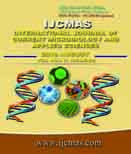


 National Academy of Agricultural Sciences (NAAS)
National Academy of Agricultural Sciences (NAAS)

|
PRINT ISSN : 2319-7692
Online ISSN : 2319-7706 Issues : 12 per year Publisher : Excellent Publishers Email : editorijcmas@gmail.com / submit@ijcmas.com Editor-in-chief: Dr.M.Prakash Index Copernicus ICV 2018: 95.39 NAAS RATING 2020: 5.38 |
The sensitivity of photosynthesis to each of the environmental variables including low water availability, high temperature, is associated with the inevitable rise in atmospheric carbon dioxide. Plant growth responses to the increasing CO2 concentration will not only affect ecosystem productivity in the future, but also the magnitude of C sequestration by plants. The level of CO2 in the atmosphere is rising at an unprecedented rate. Under elevated CO2 conditions, it has also been found that plants maintain higher total water potentials to increase biomass production and to be generally more drought tolerant. Physiological and molecular basis of varietal responses of tomato to water stress conditions and their modifications under elevated CO2 environment was studied by conducting a pot culture experiment with three varieties of tomato i.e., Manulakshmi, Vellayani Vijay and Anagha in Open Top Chambers (OTC) system. Water stress conditions were imposed on one month old potted plants during their critical stages of development and then were allowed to recover. Various biochemical and growth parameters like free amino acids, reducing sugar content, total dry matter content and antioxidants like ascorbic acid content were analysed to understand the effect of CO2 enrichment on drought tolerance. Electrophoresis analysis of proteins was performed using SDS PAGE. Elevated CO2 was found to increase total dry matter production (5.74 g), reducing sugars (15.13 mg/g), free amino acids (1.57 mg/g) and ascorbic acid (10.31 mg/100g) content. Global warming and the demands of an increasing world population will increase water scarcity, which results in increased demand for water use efficient and drought tolerant crop plants. It has become imperative to elucidate the environmental stresses. responses and adaptation of crops to water scarce conditions under changing climatic scenario and take actions to improve the drought tolerance ability of crop plants and to ensure higher crop yields against unfavourable conditions.
 |
 |
 |
 |
 |